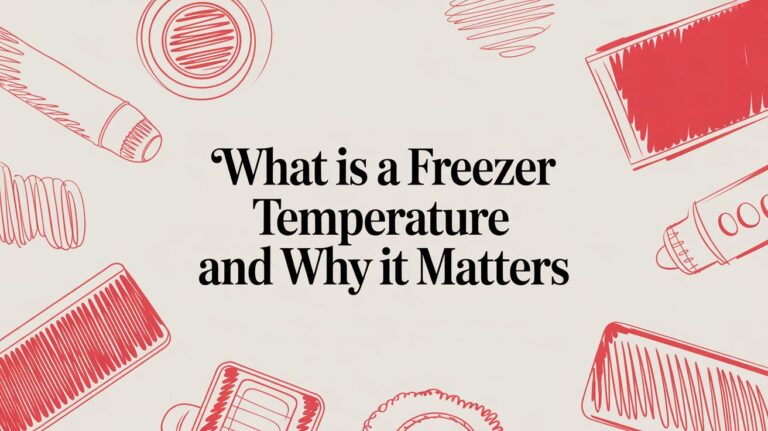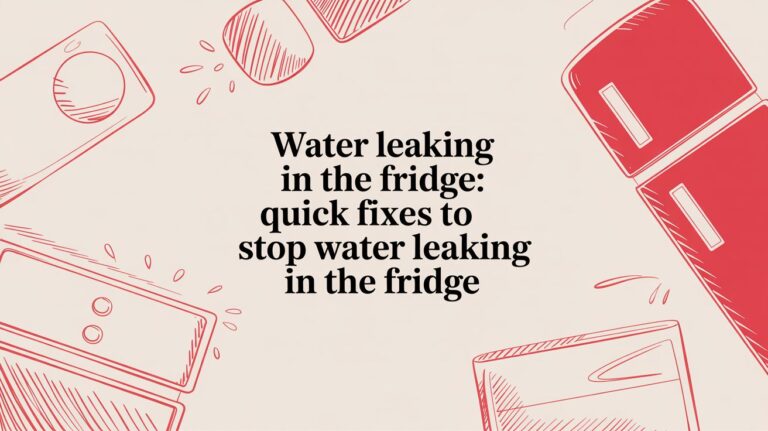It can be a little worrying when you feel the compressor on the back of your refrigerator is hot. Is this typical? Do you need to worry? Let’s examine what’s going on, why it happens, and what you can do to address it.
Is It Normal for a Refrigerator Compressor to Be Hot?
Yes, it is totally normal to a certain degree.
The compressor in your refrigerator is an important part in generating and maintaining cooling. It absorbs heat from within the refrigerator and releases it outdoors by compressing the refrigerant and moving it through the coils.
The compressor generates heat during this operation. A functioning refrigerator compressor typically runs between 35°C and 50°C (95°F and 122°F). In fact, this warmth makes it function more effectively and provides steady cooling.
However, if your refrigerator compressor is running constantly without adequately cooling the refrigerator, makes strange noises, or is too hot to touch, there is an issue that needs to be fixed.
⚡ Why Is My Fridge Compressor So Hot?
The compressor in your refrigerator may overheat for a number of reasons. By being aware of them, you can identify issues early and save more extensive repairs down the road.
-
Poor Air Circulation
The heat produced during cooling has nowhere to go if there is insufficient airflow surrounding the compressor or condenser coils. Debris accumulation, like as dust or lint, can trap heat and make the compressor work harder.
Make it right:
Unplug the refrigerator and give the condenser coils—which are often found at the bottom or back—a gentle cleaning. To get rid of debris and enhance airflow, use a coil-cleaning brush or a vacuum with a brush attachment.
-
Dirty or Blocked Condenser Fan
The majority of contemporary refrigerators employ a fan to circulate air over the coils and maintain the compressor’s temperature. The compressor may quickly overheat if this fan becomes clogged with dust or stops spinning because of a motor problem.
Fix It:
Verify that no obstructions are preventing the condenser fan from spinning freely. You might need to repair the fan motor or clean the blades if it isn’t operating.
-
Low Refrigerant Levels
Transferring heat from the refrigerator’s interior to its exterior requires refrigerant. When a leak causes the system to run low on refrigerant, the compressor compensates by operating longer, which produces more heat.
Fix it:
Regretfully, this cannot be fixed by hand. To check for leaks and safely replace the refrigerant, you will need to contact a qualified appliance repair technician.
-
Faulty Thermostat
The compressor may operate constantly if a broken thermostat is unable to sense the proper temperature. Overheating, loudness, and excessive wear result from this.
Fix it:
Adjust the thermostat’s temperature settings and check to see if the compressor shuts off as planned. Otherwise, a replacement is probably required.
-
Overloaded Refrigerator
A refrigerator that is too full inhibits ventilation and makes the cooling system work harder. In the end, the compressor runs continuously, producing more heat than normal.
Fix It:
To ensure enough air circulation, keep the refrigerator two-thirds full and provide space between foods.
-
Electrical or Voltage Issues
An overly filled refrigerator prevents airflow and increases the strain on the cooling system. Ultimately, the compressor produces more heat than usual while operating continually.
Fix It:
Leave room between goods and maintain the refrigerator two-thirds full to guarantee enough air circulation.
How to Fix a Hot Fridge Compressor (Step-by-Step)
If your refrigerator compressor feels unusually hot, follow these simple steps before calling for service:
Step 1: Clean the Condenser Coils
Find the condenser coils (bottom or rear) after unplugging the refrigerator. To get rid of dust and grime accumulation, use a vacuum or coil brush. This often resolves the problem on its own.
Step 2: Check the Condenser Fan
Make sure there are no obstructions and that the fan motor is operating smoothly. It might need to be replaced if the fan does not turn on when the compressor is operating.
Step 3: Inspect for Loose or Damaged Wires
Remove the back panel next to the compressor after unplugging the refrigerator. Look for any disconnected, frayed, or loose wires. Call an expert right once if you see burned or damaged wiring.
Step 4: Improve Ventilation
To let heat escape, move your refrigerator at least two to three inches from the wall. If the unit is situated in a small kitchen corner, make sure there is room for ventilation around it.
When to Call a Professional
If you’ve cleaned the coils and checked airflow but your refrigerator compressor is still hot to touch, it’s best not to ignore it. Persistent overheating can damage internal components and lead to costly repairs.
A qualified technician can:
- Check refrigerant levels
- Test electrical voltage
- Inspect compressor pressure
- Repair or replace the thermostat
Preventing Compressor Overheating
To keep your fridge compressor running efficiently:
- Clean condenser coils every 3–6 months
- Avoid overloading the refrigerator
- Keep the fridge away from heat sources (like ovens)
- Ensure proper spacing behind and beside the appliance
- Schedule yearly professional maintenance
Need Help?
If your fridge compressor is overheating, making noise, or your refrigerator isn’t cooling properly, it’s time to get it checked by a local expert.
We offers same-day refrigerator repair for all major brands. Our technicians can diagnose compressor issues quickly and get your fridge running safely again.
Call 587-416-5888 or book your fridge repair in Edmonton today.




